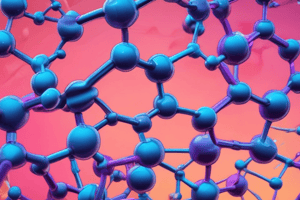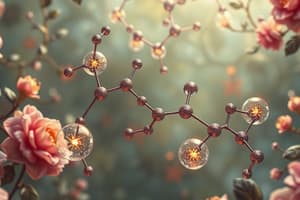Podcast
Questions and Answers
What is the defining characteristic of organic compounds?
What is the defining characteristic of organic compounds?
- Do not contain carbon atoms
- Made only from synthetic sources
- Found only in non-living organisms
- Contain carbon-hydrogen bonds (correct)
Which of the following is an example of an inorganic compound?
Which of the following is an example of an inorganic compound?
- Propane
- Glucose
- Calcium carbonate (correct)
- Chloroform
What is the main difference between alkanes and alkenes?
What is the main difference between alkanes and alkenes?
- Alkanes are found in inorganic compounds, alkenes in organic compounds
- Alkenes are nonpolar, alkanes are polar
- Alkenes have double covalent bonds, alkanes have single covalent bonds (correct)
- Alkanes are more reactive than alkenes
Why are hydrocarbons classified as organic compounds?
Why are hydrocarbons classified as organic compounds?
Which type of carbon compound includes substances like sodium bicarbonate?
Which type of carbon compound includes substances like sodium bicarbonate?
Why are organic compounds primarily derived from natural sources like plants and animals?
Why are organic compounds primarily derived from natural sources like plants and animals?
What type of bonds do alkenes have between carbon atoms?
What type of bonds do alkenes have between carbon atoms?
How do alkynes differ from alkenes and alkanes?
How do alkynes differ from alkenes and alkanes?
What is a characteristic property of aromatic hydrocarbons?
What is a characteristic property of aromatic hydrocarbons?
Why do many carbon compounds exhibit hydrophobic properties?
Why do many carbon compounds exhibit hydrophobic properties?
In which industry are carbon compounds like petroleum primarily used?
In which industry are carbon compounds like petroleum primarily used?
What makes carbon compounds crucial in materials science?
What makes carbon compounds crucial in materials science?
Flashcards are hidden until you start studying
Study Notes
Carbon Compounds: The Building Blocks of Life and Chemistry
Carbon is an extraordinary element, forming a diverse range of compounds that are essential to life and countless materials. From the molecules of our bodies to the products we use daily, carbon compounds have a ubiquitous presence. In this article, we'll explore the fascinating world of carbon compounds, beginning with their definition and then delving into their classification, properties, and importance.
Definition
Carbon compounds are chemical substances containing carbon atoms, which often bond with other elements such as hydrogen, oxygen, and nitrogen. These compounds are grouped into various classes according to their structures and properties.
Types of Carbon Compounds
-
Organic compounds: These are carbon compounds that contain carbon-hydrogen bonds. Organic compounds are found in living organisms and are primarily derived from natural sources like plants and animals.
-
Inorganic compounds: These are carbon compounds that do not contain carbon-hydrogen bonds. Inorganic carbon compounds include carbonates (e.g., calcium carbonate) and bicarbonates (e.g., sodium bicarbonate).
-
Hydrocarbons: These are organic compounds consisting solely of carbon and hydrogen atoms. Hydrocarbons are classified into several categories:
a. Alkanes: Also known as saturated hydrocarbons, alkanes have single covalent bonds between carbon atoms. They are nonpolar and are generally less reactive.
b. Alkenes: These have double covalent bonds between carbon atoms, making them unsaturated hydrocarbons. Alkenes are more reactive than alkanes and can undergo reactions like addition and polymerization.
c. Alkynes: Alkynes are hydrocarbons with triple covalent bonds between carbon atoms. Like alkenes, alkynes are unsaturated and reactive.
d. Aromatic hydrocarbons: These hydrocarbons contain one or more benzene rings, which consist of a hexagonal ring with alternating single and double bonds. Aromatic hydrocarbons are relatively stable and have characteristic chemical properties.
Properties of Carbon Compounds
Carbon compounds exhibit a variety of properties that make them useful in countless applications.
-
Covalent bonding: Carbon forms strong covalent bonds with other elements, resulting in compounds with high molecular weight and stability.
-
Variability: Carbon compounds can form an enormous range of molecules due to the large number of ways carbon atoms can be bonded together.
-
Hydrophobic properties: Many carbon compounds have hydrophobic properties due to the presence of nonpolar covalent bonds, making them useful in applications such as detergents and oil spill remediation.
-
Polarity: Carbon compounds can exhibit polar or nonpolar properties, depending on their molecular structure.
Applications of Carbon Compounds
Carbon compounds are essential in countless applications across various industries:
-
Medicine: Carbon compounds like glucose, amino acids, and steroids are vital components of pharmaceuticals and nutritional supplements.
-
Energy: Carbon compounds like petroleum, natural gas, and coal are the primary sources of energy in the world.
-
Materials science: Carbon compounds are used in the production of materials like plastics, rubber, and carbon fibers.
-
Chemical industry: Carbon compounds are used in the production of chemicals like fertilizers, pesticides, and dyes.
In conclusion, carbon compounds are crucial to the world around us, offering a wealth of opportunities for scientific discovery, technological advancement, and sustainable development. Embracing the importance of carbon compounds and understanding their chemical properties enables us to harness their full potential.
References: (No references are included in this article)
Studying That Suits You
Use AI to generate personalized quizzes and flashcards to suit your learning preferences.




